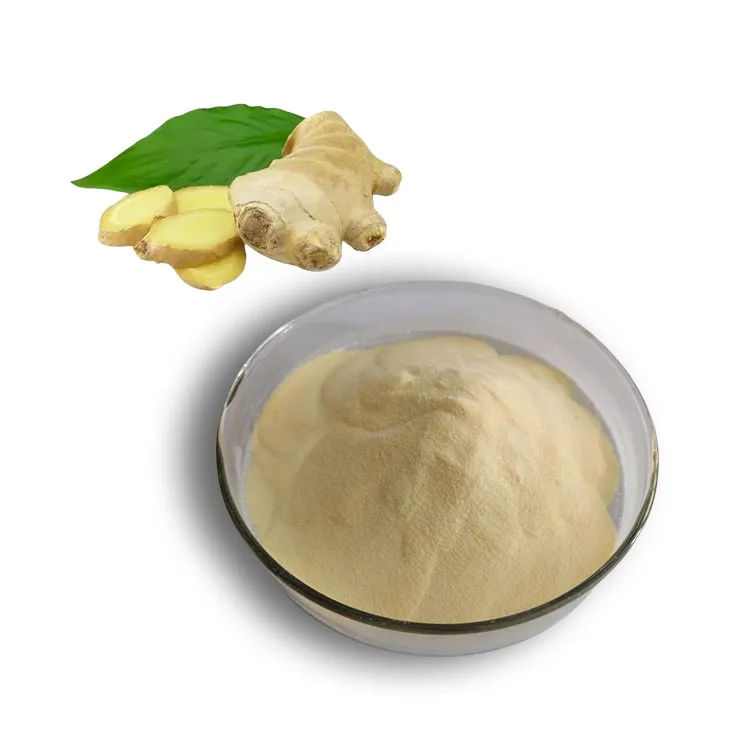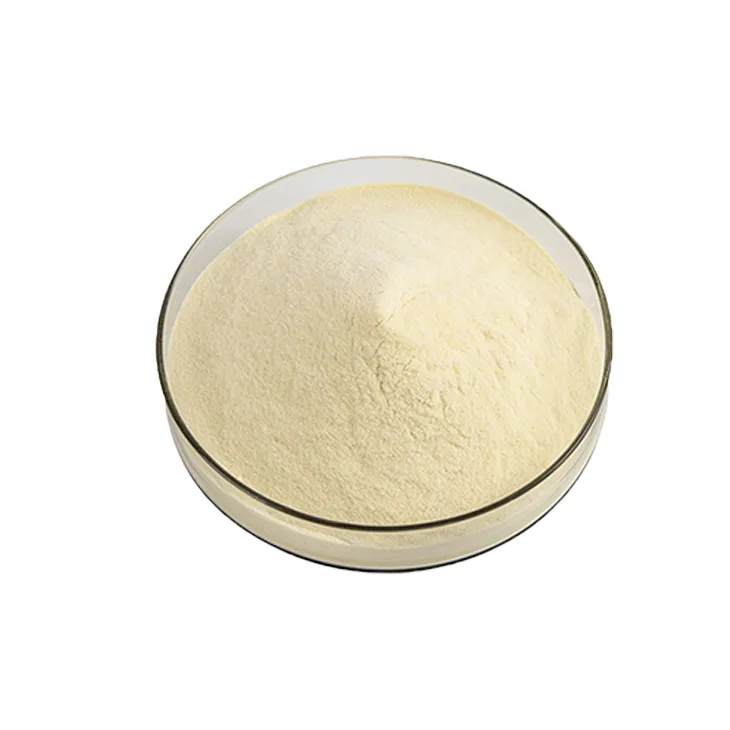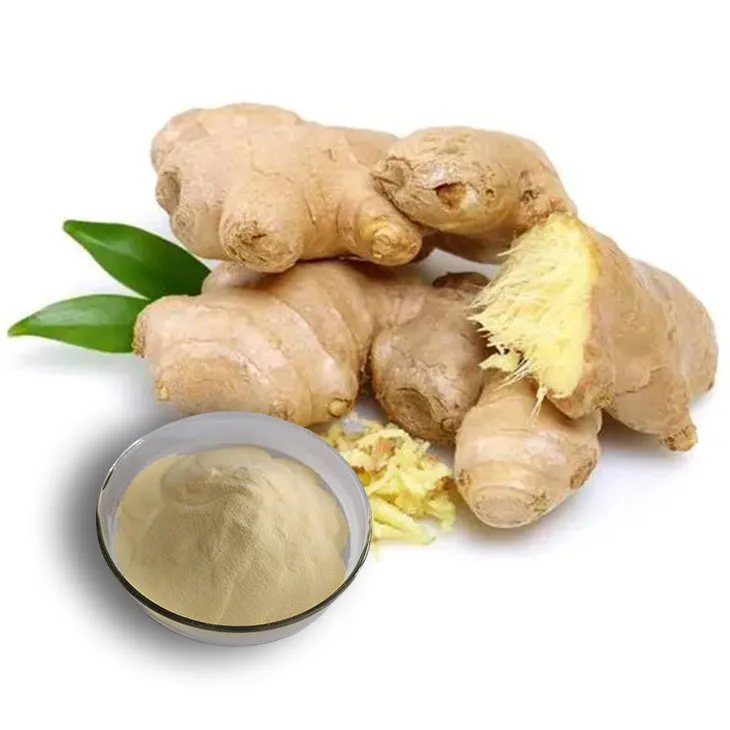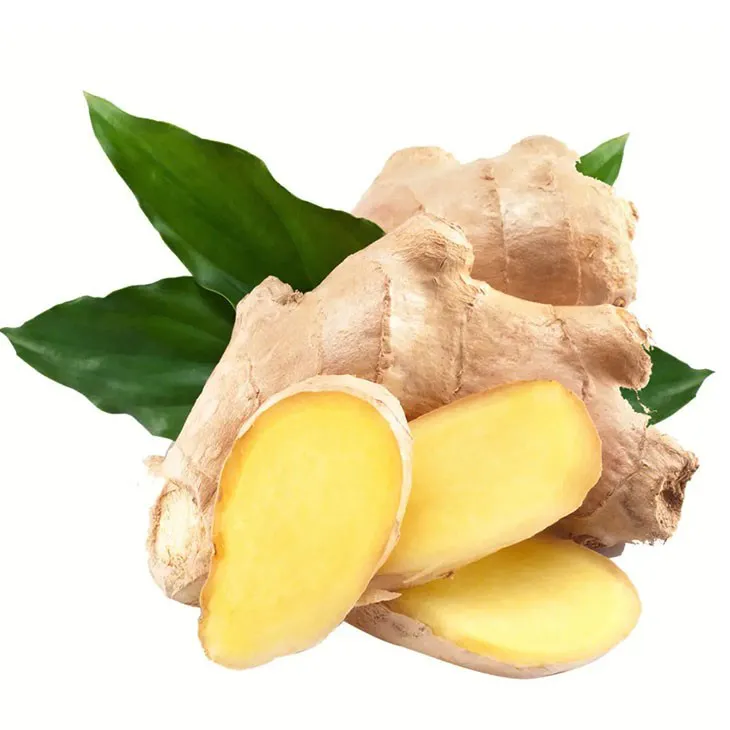- 0086-571-85302990
- sales@greenskybio.com
4 Things Consumers and Manufacturers Should Know about Ginger Extract.
2024-12-11

1. Wide - ranging Applications of Ginger Extract
Ginger Extract has found its place in various industries, making it a highly versatile substance.
Food Industry
In the food industry, Ginger Extract is a popular ingredient. It is used in a wide array of products. For example, it is added to baked goods such as gingerbread, where it imparts a distinct and warm flavor. Ginger extract is also a key component in many spice blends, enhancing the overall taste profile. It can be found in sauces, marinades, and dressings, adding a zesty and slightly spicy note. Moreover, in the production of beverages, ginger extract is used in ginger ale, teas, and even some alcoholic drinks. Its unique flavor makes it a favorite among consumers who enjoy a bit of spice in their food and drinks.
Medicine Industry
When it comes to the medicine industry, ginger extract has been studied for its numerous health benefits. It has long been known for its anti - nausea properties. It is often recommended for pregnant women experiencing morning sickness or patients undergoing chemotherapy. Ginger extract also has anti - inflammatory properties. It can help reduce inflammation in the body, which is beneficial for those suffering from conditions such as arthritis. Additionally, it may have a positive impact on digestion. It can stimulate the production of digestive enzymes, aiding in better absorption of nutrients and alleviating digestive problems such as indigestion and bloating.
Cosmetics Industry
In the cosmetics industry, ginger extract is used for its antioxidant properties. Antioxidants are crucial in cosmetics as they help fight free radicals, which can cause premature aging of the skin. Ginger extract can be found in skincare products such as creams, lotions, and serums. It may also have a toning effect on the skin, improving its overall appearance. In haircare products, ginger extract can stimulate the scalp, promoting hair growth and potentially reducing hair loss. This makes it a valuable ingredient in shampoos and conditioners.

2. Factors Influencing the Cost and Pricing of Ginger Extract
The cost and pricing of ginger extract are influenced by several factors, which both consumers and manufacturers need to be aware of.
Raw Material Quality
The quality of the raw ginger used to produce the extract is a significant factor. High - quality ginger, which is fresh, free from diseases, and has a high gingerol content (the main bioactive compound in ginger), will generally result in a more potent and desirable extract. Ginger that is grown in ideal conditions, such as in regions with the right climate and soil quality, is likely to be of better quality. However, obtaining such high - quality ginger may be more expensive. For example, ginger grown organically may cost more due to the stricter farming practices involved. Manufacturers may pass on this increased cost to the consumers in the form of a higher - priced ginger extract.
Extraction Method
The extraction method also plays a role in determining the cost. There are different extraction techniques available, such as solvent extraction, steam distillation, and supercritical fluid extraction. Solvent extraction is a commonly used method, but the choice of solvent can affect the cost. Some solvents may be more expensive than others, and the process may require additional purification steps to remove the solvent residues. Steam distillation is a more natural method but may be less efficient in terms of yield compared to other methods. Supercritical fluid extraction, on the other hand, is a relatively new and advanced technique that can produce a high - quality extract with a high concentration of bioactive compounds, but it requires specialized equipment and is more costly to operate. These factors related to the extraction method can impact the final cost of the ginger extract.
Supply and Demand
Supply and demand dynamics have a direct impact on the cost and pricing of ginger extract. If there is a high demand for ginger extract in various industries but a limited supply, the price is likely to increase. For instance, if there is a sudden trend in the cosmetics industry towards using ginger extract in a large number of new product launches, and the supply of ginger cannot keep up with this increased demand, the cost of ginger extract will go up. On the other hand, if there is a bumper crop of ginger in a particular year, leading to an oversupply, the price may decrease. Additionally, factors such as changes in consumer preferences, emerging markets for ginger extract, and competition among manufacturers can also influence the supply - demand balance and, consequently, the cost.

3. Emerging Research Findings on Ginger Extract that Consumers Should be Aware of
As research on ginger extract continues, new and exciting findings are emerging that are relevant to consumers.
Potential Anti - cancer Properties
Recent studies have suggested that ginger extract may have potential anti - cancer properties. Laboratory research has shown that certain compounds in ginger extract can inhibit the growth of cancer cells in vitro. For example, some studies have focused on ginger's effect on colorectal cancer cells and have found that it may interfere with the cell cycle and induce apoptosis (programmed cell death) in these cancer cells. However, it is important to note that while these findings are promising, more research is needed, especially in vivo studies and clinical trials, to determine if ginger extract can be used as a complementary or alternative treatment for cancer in humans.
Benefits for Brain Health
There is also growing evidence regarding the benefits of ginger extract for brain health. It has been suggested that ginger extract may have neuroprotective effects. Some studies have found that it can reduce oxidative stress in the brain, which is associated with neurodegenerative diseases such as Alzheimer's and Parkinson's. Ginger extract may also improve cognitive function, including memory and attention. For instance, in animal studies, ginger - treated animals have shown improved performance in memory - related tasks. Again, more research in humans is required to fully understand the extent of these benefits and how ginger extract can be incorporated into strategies for maintaining brain health.
Impact on Cardiovascular Health
Research has indicated that ginger extract may have a positive impact on cardiovascular health. It may help in reducing blood pressure. Some studies have shown that ginger extract can relax blood vessels, which in turn can lead to a decrease in blood pressure levels. Additionally, it may have a role in improving lipid profiles. Ginger extract has been shown to potentially lower LDL (bad) cholesterol levels and increase HDL (good) cholesterol levels. This can contribute to a reduced risk of cardiovascular diseases such as heart attacks and strokes. However, as with the other research findings, further studies are needed to confirm these effects and to determine the appropriate dosage for optimal cardiovascular benefits.

4. Sustainability Issues Manufacturers Need to Consider in the Production of Ginger Extract
Manufacturers of ginger extract must take into account several sustainability issues to ensure the long - term viability of their production processes.
Environmental Impact of Ginger Cultivation
The environmental impact of ginger cultivation is an important consideration. Ginger is typically grown in tropical and subtropical regions. The expansion of ginger plantations can lead to deforestation in some areas if not managed properly. Deforestation can have a range of negative consequences, including soil erosion, loss of biodiversity, and disruption of local ecosystems. Additionally, the use of pesticides and fertilizers in ginger cultivation can also have an environmental impact. Excessive use of these chemicals can contaminate soil and water sources. Manufacturers should encourage sustainable farming practices among ginger growers, such as organic farming methods that reduce the use of synthetic pesticides and fertilizers, and promote agroforestry techniques to minimize deforestation.
Resource Conservation
Resource conservation is another aspect of sustainability. Ginger extraction processes often require significant amounts of water, energy, and other resources. For example, in steam distillation, a large amount of energy is used to generate steam. Manufacturers should explore ways to reduce their resource consumption. This could involve investing in more energy - efficient extraction equipment, recycling water where possible, and optimizing production processes to minimize waste. By conserving resources, manufacturers can not only reduce their environmental footprint but also potentially lower their production costs in the long run.
Fair Trade and Social Responsibility
Fair trade and social responsibility are crucial elements in the production of ginger extract. Ginger is often sourced from developing countries, and many small - scale farmers are involved in its cultivation. Manufacturers should ensure that they engage in fair trade practices, which means paying farmers a fair price for their ginger. This helps to support the livelihoods of these farmers and their communities. Additionally, manufacturers should also consider the working conditions of those involved in the ginger supply chain, including farm workers and factory employees. By promoting fair trade and social responsibility, manufacturers can contribute to the sustainable development of the regions where ginger is sourced and enhance their brand image among consumers who are increasingly concerned about ethical consumption.

FAQ:
Q1: What are the main applications of ginger extract in the food industry?
Ginger extract is widely used in the food industry. It can be added to various products such as beverages, baked goods, and candies. In beverages, it adds a unique flavor and aroma. In baked goods, it can enhance the taste and also has preservative - like properties. In candies, it gives a spicy and refreshing taste.
Q2: How does the quality of raw ginger affect the cost of ginger extract?
The quality of raw ginger is a crucial factor in determining the cost of ginger extract. High - quality ginger with a strong flavor and high gingerol content may be more expensive to source. If the ginger is of poor quality, it may require more processing or yield less extract, thus increasing the overall cost per unit of extract.
Q3: What are some recent research findings about ginger extract that are relevant to consumers?
Recent research has found that ginger extract may have potential health benefits. For example, it may have anti - inflammatory properties that could help with conditions like arthritis. It may also aid in digestion and have antioxidant effects, which can contribute to overall health and well - being.
Q4: What sustainability challenges do manufacturers face in producing ginger extract?
Manufacturers of ginger extract face several sustainability challenges. One is the proper management of ginger cultivation, ensuring that it is grown in an environmentally friendly way without excessive use of pesticides and fertilizers. Another challenge is efficient water use during the production process. Also, ensuring fair labor practices in the regions where ginger is sourced is an important aspect of sustainability.
Q5: How is the pricing of ginger extract determined in the production process?
The pricing of ginger extract in the production process is determined by multiple factors. The cost of raw materials, including the price of ginger and any additives or solvents used, is a significant factor. Labor costs, energy costs for processing, and the cost of any equipment or facilities also play a role. Additionally, market demand and competition can influence the final pricing.
Related literature
- The Bioactive Compounds in Ginger Extract and Their Applications"
- "Ginger Extract: Production, Cost Analysis and Market Trends"
- "Sustainable Ginger Extract Production: Current Practices and Future Directions"
- ▶ Hesperidin
- ▶ Citrus Bioflavonoids
- ▶ Plant Extract
- ▶ lycopene
- ▶ Diosmin
- ▶ Grape seed extract
- ▶ Sea buckthorn Juice Powder
- ▶ Fruit Juice Powder
- ▶ Hops Extract
- ▶ Artichoke Extract
- ▶ Mushroom extract
- ▶ Astaxanthin
- ▶ Green Tea Extract
- ▶ Curcumin
- ▶ Horse Chestnut Extract
- ▶ Other Product
- ▶ Boswellia Serrata Extract
- ▶ Resveratrol
- ▶ Marigold Extract
- ▶ Grape Leaf Extract
- ▶ New Product
- ▶ Aminolevulinic acid
- ▶ Cranberry Extract
- ▶ Red Yeast Rice
- ▶ Red Wine Extract
-
Dan Shen Root Extract/Salvia Root Extract
2024-12-11
-
Saw Palmetto Extract
2024-12-11
-
Pine bark Extract Powder
2024-12-11
-
Grapefruit Seed Extract Powder
2024-12-11
-
Thunder God Vine Extract
2024-12-11
-
Horse Chestnut Extract
2024-12-11
-
Dandelion Root Extract
2024-12-11
-
Withania Somnifera Extract
2024-12-11
-
Coconut Water Powder
2024-12-11
-
Yohimbine Bark Extract
2024-12-11





















